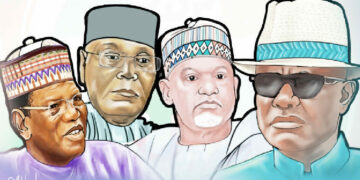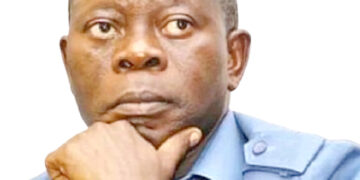From stiff opposition to a rather unenthusiastic acceptance, the issue of fuel subsidy has remained a puzzle in Nigeria. As a topic for national debate, the subsidy regime has traversed an unrestrained path, leaving both policymakers and citizens confused.
When former President Goodluck Jonathan announced the suspension of subsidy in 2012, opposition groups, most of which would eventually congregate to form the present ruling party, vehemently opposed the move.
The argument then, among others, was that the funds that will accrue to the nation from subsidy removal would be misappropriated. After a series of protests, Jonathan kowtowed to pressure from the opposition and retained the subsidy regime.
Fast forward to 2015, came the All Progressives Congress (APC) government of President Muhammadu Buhari, a man who used different adjectives to describe subsidy before assuming power, only to spend eight years approving substantial payments for petrol subsidy.
From January to May 2023 when Buhari left power, the nation spent over N1 trillion on subsidy, euphemistically described as under-recovery. As a matter of fact, the government said subsidy on petrol, if not suspended, would cost the nation over N6trn by the end of 2023.
With very huge debt and dwindling revenue, the current administration of President Bola Ahmed Tinubu (PBAT) knew clearly that subsidy was not sustainable. But without concrete plans for palliatives to cushion the impact of subsidy removal, PBAT declared that ‘Subsidy is gone’.
Not surprising, therefore, petrol pump prices jerked from N197 to N480, then N570 before settling at a staggering N615/630 depending on one’s location and the outlets selling the product.
What naturally followed was an increase in the cost of transportation, food items and other services because adjustment in petrol prices, over the years, always impacts on the prices of other goods and services in Nigeria.
Definitely, Nigerians are now grappling with soaring prices of foodstuff in the face of skyrocketing cost of transportation and steep increase in school fees among other incidentals. But is the subsidy on petrol truly gone?
Illusive disappearance
After using petrol subsidy to play politics that eventually paved the way for it to assume power, the ruling APC has been caught in the web of the monster it used, among other things, to ascend to power. And taming it is proving to be an outright impossibility. Karma is indeed a bitch.
Despite promising an end to the fraudulent subsidy system, it became evident that the present administration was still subsidising petroleum products months after the PBAT ‘Subsidy is gone’ speech in which he assured Nigerians that the era of subsidy with all its associated fraud is over for good.
Although PBAT, while further justifying his decision to declare that subsidy was gone, informed Nigerians that there was no provision for subsidy in the 2023 budget, it is clear that the new administration had no workable plans to mitigate the impact of subsidy withdrawal.
Shortly after the ‘Subsidy is gone’ speech, the government took Nigerians on a long walk, as it continued to experiment with what it called measures to cushion the impact of subsidy removal.
In the face of the backlash that greeted its cash transfer proposal, the federal government doled out N5billion to states to purchase food stuffs for distribution to the most vulnerable Nigerians as if we all, except the political class, are not vulnerable.
The return of subsidy
As states continue to share the palliative in the midst of reports that the pump price would go up as a result of fluctuation in the global oil market, there are copious reports suggesting that the nation is paying billions of naira to help stabilise the price of petrol at the current N615/630 per litre, suggesting clearly that we are back to where we started. Subsidy is back, pure and simple!
If there is anyone out there who is still doubting the fact that the PBAT administration is paying what it, like the APC government it succeeded, described as a fraud and benefitting a few privileged individuals, then ask yourself what magic the government is doing now that the landing cost of petrol has dwarfed the current pump price.
But then, look no further as the Petroleum and Natural Gas Senior Staff Association of Nigeria (PENGASSAN), late last week, confirmed the return of fuel subsidy.
“They are paying a subsidy today. In reality today, there is subsidy because as of when the earlier price was determined, the price of crude in the international market was somewhere around $80 for a barrel. But today, it has moved to about $93/94 per barrel for Brent crude. So, because it has moved, then the price [of petroleum] also needed to move,” PENGASSAN president, Festus Osifo, said.
The return to subsidy suggests clearly that the initial ‘subsidy is gone’ declaration was done without careful analysis of all the variables. And that is part of the downside of leadership in Nigeria.
Subsidy a necessity
I am one of those who believe that the government’s decision to suspend petrol subsidy at a time like this is ill-conceived. While some argue for the suspension of subsidies, it’s worth noting that subsidies are essential globally to ease the burden on citizens, as they correct market failures and promote economic efficiency.
Even though the World Bank and IMF have repeatedly harped on the need for the government to suspend subsidy, the fact that the Western countries, including the United States, heavily subsidize different sectors, including for instance the agricultural sector, oil and energy, housing, automakers and healthcare, cannot be easily lost on us.
Claims about subsidy in Nigeria benefitting only a privileged few need reconsideration. In a country where more than 100 million citizens are considered multi-dimensionally poor, suspending petrol subsidy with all its attendant impacts on the prices of foodstuff and other services is not only a thoughtless decision, but callous.
Unanswered questions
What is befuddling is the fact that the government still insists there is no subsidy. And that is a story for the birds. Full stop. If we have been told that subsidy is gone and we are seeing clear signs which suggest that it has been returned, shouldn’t the government come out clean by telling Nigerians that indeed, subsidy is back?
Since there is no budgetary provision for subsidy payment, where is the fund being used to subsidise petroleum products now, sourced from? Who approves it? How much is earmarked for that and for how long?





